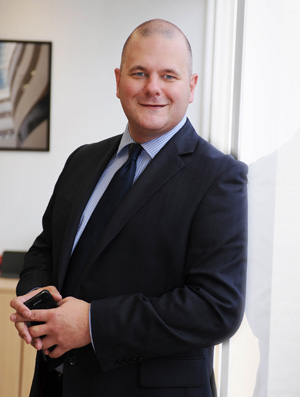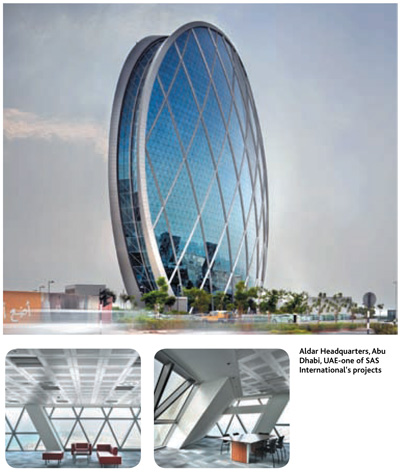The acoustic environment of a workplace is considered to be a primary driver for occupant productivity and comfort. Jerome Sanchez speaks to Andrew Jackson, Group Marketing Director at SAS International, to get an insight into the issue and the strategies his company has adopted in the region.
The acoustic environment of a workplace is considered to be a primary driver for occupant productivity and comfort. Jerome Sanchez speaks to Andrew Jackson, Group Marketing Director at SAS International, to get an insight into the issue and the strategies his company has adopted in the region.
 How are the Middle East operations of SAS International doing so far?
How are the Middle East operations of SAS International doing so far?
We’re doing very well in the Middle East. We’ve been operating here for over 30 years, and we set up an office and warehouse operation back in 2008. We have been servicing projects in the UAE, Qatar, Saudi Arabia, Bahrain and Oman out of the Dubai office since then. We have a mix of design and supply manufactured products into projects, as well as commodity products which are available from our warehouse on a day-to-day basis.
What is your view of the GCC states and the Middle East? Does the market outlook in this region continue to be positive for your company? Which countries in this region are showing significant growth?
The Middle East is an important part of the business for us. We set up our office during the downturn, because we wanted to have a long-term commitment in the region. It’s an integral part of developing our business. Obviously, not every part of the Middle East is busy. We’re busy in Qatar and Saudi Arabia as priorities. It’s difficult for us, because we have a business which is very much design-led and specification-led for architects. But we also have a business which is fitting out commercial office buildings for letting. There are huge new commercial office projects being developed in the region. There are a lot of refurbishments, and we tend to supply products to those refurbishments. On the flipside, for the new-build, the projects are mainly coming out from the education and transport sectors, and we are also involved in those large projects.
Being a member of GSAS (Global Sustainability Assessment System), in what concrete ways can your products contribute towards credits for areas such as acoustics, VOCs, recycled materials and design for disassembly?
We have been a member of GSAS for about eight months now. We lead on specification on our primary product – metal ceiling systems. Acoustics is a serious part of specifying suspended metal ceiling systems, as they are there to create comfort within the workspace and to ensure that productivity is at its maximum. So, acoustics is a key part of comfort.
The benefit of using metal as raw material for ceilings is that you can engineer the system. Metal is a very durable, long-lasting product that has residual value for the client at the end of its use, which is normally for about 20 to 30 years, which fits very well into the GSAS standards. Acoustics ought to be measured as part of the GSAS standards, and we can meet any acoustic value using metal ceilings, which is not very well known within the region. Metal ceilings, being an engineered system, are easier to integrate with lighting, air conditioning and sprinkler systems, compared to doing a lot of work onsite. The only disadvantage is that you have to design the different integrated products before you supply products onsite. As an engineered system, it is also pretty easy to disassemble. This also fits within the criteria of GSAS quite well. In addition, metal is the most recycled material in the construction industry. There is no VOC demand on metal, so we are totally VOC-free.
Do you have plans of expanding your operations in the Middle East? How about to Turkey or Iraq?
Currently, we have no plans of setting up an office in Iraq or in Turkey. Being a privately owned business, we are very flexible in the way that we operate. So, if we have an opportunity in a given market, whether it’s Turkey or Iraq or wherever, we can act quite quickly.
 Could you tell us some of the new products that you are introducing to the Middle East market and what technologies they contain?
Could you tell us some of the new products that you are introducing to the Middle East market and what technologies they contain?
SAS priority products in this region are suspended ceilings and architectural metalwork. The key new ceiling systems we are offering the Middle East are acoustic baffles and acoustic wall panelling – again focusing very much on the acoustic comfort of a room or of an area like an airport terminal. We are also doing aluminium and steel tube lines, which is a ceiling system using well-formed aluminium and steel. We also manufacture a lot of different design metal systems – bulkheads, wall paneling, bulkhead details and binnacles.
How has your company responded to the issues of energy efficiency and other environmental issues?
Sustainability is always a very tricky word; it all depends on what you mean by sustainability. SAS has three core values: innovation, quality and value. Sustainability fits in most of those areas. We have to design good products and we have to deliver an extraordinary amount of value for our end-users, architects and main contractors. Everybody is looking at price, but they always want the best, the most sustainable and the most environmentally friendly products. So, we are constantly making sure that we are innovating.
Every single product we manufacture is made out of steel or aluminium – two of the most recycled elements in the world. We design in accordance with environmental accreditations. We make sure that our products are durable and easy to maintain, so our users get a lot more long-term value from our products.
SAS International is the first manufacturer of ceiling systems to publish its environmental product declaration. We have 13 of those across all of our ceiling systems, and there’s no other ceiling manufacturer in the Middle East which offers that. From an environmental point of view, we are doing as much as we can do.
Copyright © 2006-2025 - CPI Industry. All rights reserved.